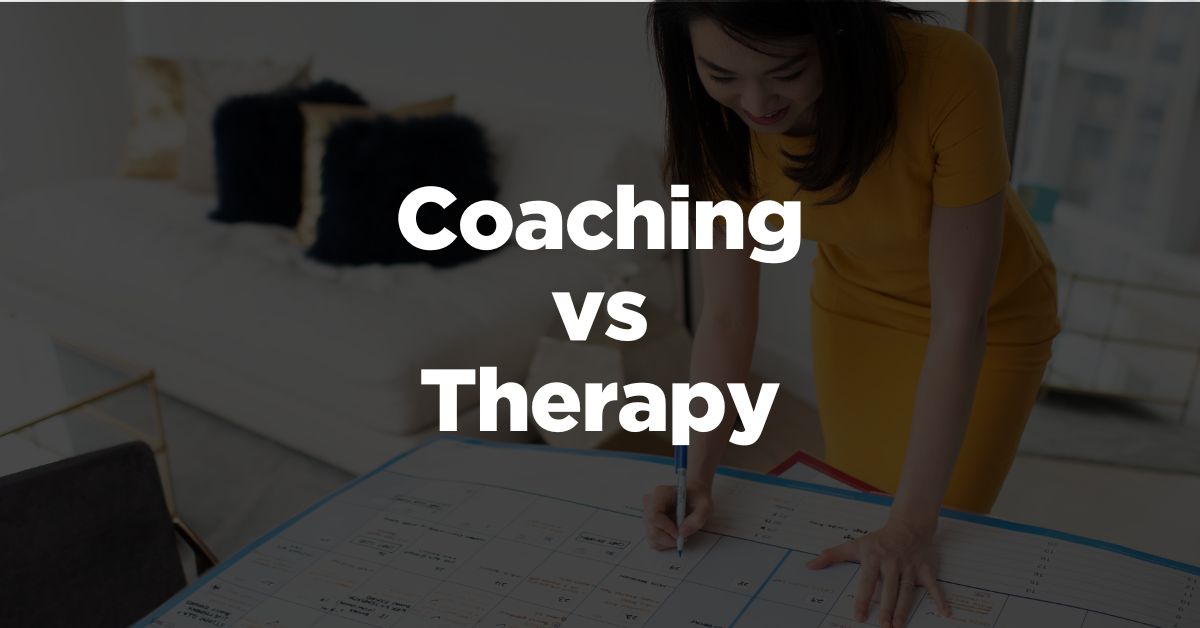What’s the difference between coaching vs. therapy?
You’re in the right place!
By the end of this article, you’ll know exactly what you will and won’t be doing as a coach or therapist.
Plus, you’ll learn how your much-needed coaching services can fill a gap in the market.
Ready to dive in?
Let’s go!
You’ll learn:
- The difference between a coach and a therapist
- Comparing coaching with therapy
- Do you need a coach or a therapist?
- How do you choose the right therapist?
- How do you choose the right coach?
What is the difference between coaching vs. therapy?
Let’s start by clearing up a common question:
What’s the difference between a coach and a therapist?
Therapists
- Credentials: Licensed health professionals who can only work in states where they’re licensed.
- Diagnosis: Can diagnose and treat mental illnesses.
- Medications: Depending on the state, they can prescribe meds.
- Education: Need a higher level of education and usually hold a master’s or even a doctorate degree.
- Focus: Their primary goal is to treat mental health issues.
- Scope: Trained to address different mental health issues, from anxiety and depression to more severe psychiatric disorders.
- Relationship: Usually a long-term relationship with a lot of professional distance.
Get the Ultimate Guide
for building a
6-Figure Coaching Business so you can achieve more freedom!
Coaches
- Credentials: Generally, no licenses or certifications are needed, although some niches do require them. Specifically, health and mental health niches.
- Diagnosis: Not trained to diagnose mental illnesses, but there to strengthen mental fitness.
- Medications: Can’t prescribe meds, but can forward clients to medical professionals who can.
- Focus: Action-oriented and goal-focused. You work with clients to create positive changes and achieve specific results.
- Scope: Usually specialize in a particular niche for quicker, more effective results.
- Relationship: Often for a limited time — until the client’s goals are reached. But it can be long-term too. There’s less need for professional distance.
These are some key differences between coaching and therapy.
Now, let’s dive deeper into how they compare in practice.
Comparing coaching with therapy
One in four people have been diagnosed with a mental health condition. So, there’s demand for both coaches and therapists.
On the coaching front, the global revenue generated by coaching grew by over 60% over the past few years.
This shows people value personal development and mental well-being more than ever.
Both therapy and coaching can greatly improve people’s quality of life, but they do so in different ways.
Let’s take a closer look.
Goal
- Therapy: The main goal is healing from mental health issues like anxiety, depression, and trauma.
- Coaching: Very results-oriented. The focus is on helping clients achieve concrete and specific goals.
10 examples of coaching goals in different niches are:
- Creating a better work/life balance
- Navigating big life transitions
- Improving communication skills
- Reaching financial independence and security
- Mastering time management
- Finding a fulfilling spiritual path
- Overcoming public speaking fears
- Discovering creativity
- Developing a business plan
- Cultivating a positive mindset
Of course, therapists also work with goals — ’healing from mental illness’ is a goal in itself.
But in coaching, they are clearer and more specific.
If a client comes with a general idea like “improve health” or “strengthen mental fitness”, coaches make this actionable.
They break it down into achievable milestones and then divide these into subgoals.
This makes progress easier to track.
Plus, this results-oriented approach fits well with coaching’s focus…
Focus
- Therapy: Huge focus on understanding the past, or recovering from any past trauma, to move forward.
- Coaching: Mostly present and future-oriented.
While therapists dig into the ‘why’ of a client’s patterns, coaches look more at the ‘how’ of moving toward specific outcomes.
So, rather than exploring the past to make sense of current behaviors, coaches figure out what needs to be done now to reach future goals.
That said, experienced coaches do understand how the past influences the present. Just as how psychotherapists guide clients toward personal milestones.
Plus, certain therapeutic approaches are more present-focused than others. Solutions-focused brief therapy (SFBT) and Cognitive Behavioral Therapy (CBT) are two examples.
Another difference is the type of client you work with.
As a coach, you work with “healthy” clients who:
- Feel stuck and need some direction
- Don’t know how to achieve their goals
- Struggle to make changes on their own
- Are looking for excellence or extraordinary results in their lives
While coaches set out to offer a transformative experience, they don’t try to change deep-seated personality traits.
The idea isn’t to change who clients are at their core. Instead, it’s about building on what they already have and making things better.
Now, let’s see how this focus plays out in the structure of therapy and coaching sessions.
Structure
- Therapy: Therapy sessions usually happen in person, though online therapy is becoming more common. The way sessions are structured varies a lot.
- Coaching: Coaching sessions have a clear structure but are flexible in format. They can take place anytime, anywhere.
Despite these general trends, some psychotherapists offer services over the phone or online. And some coaches have physical offices.
Because there’s less of a need for professional distance in coaching, coaches might meet clients in public spaces like parks or coffee shops. This isn’t common for therapists.
Psychotherapists are also bound by location-based restrictions.
For instance, they need a state-specific license to practice, whereas coaches can work across the U.S. and even globally.
However, always check for any specific rules. Especially if you’re coaching in specialized areas like (mental) health.
In contrast to these restrictions, therapy’s structure is more open-ended. This gives room to explore issues as they come up.
Coaching sessions, on the other hand, are very structured. Because the focus is on specific outcomes each session is purposeful and goal-oriented.
Next, let’s take a look at the different methods.
Get the Ultimate Guide
for building a
6-Figure Coaching Business so you can achieve more freedom!
Methods
- Therapy: The methods depend on the therapeutic approach. Common ones are CBT, EMDR, and talk therapy. Sometimes, therapists might also prescribe medication to manage symptoms.
- Coaching: Coaches never prescribe medication. But they use the format of setting goals, creating a roadmap, tracking progress, and accountability.
Many coaches integrate techniques from various fields like:
- Evidence-based coaching psychology
- Positive psychology
- Learning theory
- Motivational interviewing
- Neuroscience
- And so on
They use these techniques to help clients express their goals and develop strategies to overcome challenges.
Therapists are, once again, bound by stricter regulations. They only offer services in areas where they’re trained. For example, to use CBT or EMDR, a therapist must have completed training in these methods.
Coaches don’t deal with such strict rules, although you need real-life experience to offer clients great results.
Given the different tasks and methods, it’s no surprise that the educational requirements are quite different too.
Education
- Therapy: Therapists need to have completed higher education and training. Plus, they need a state license to practice.
- Coaching: Apart from some niches there are no formal requirements.
As a growing field, coaching doesn’t have fixed educational standards yet.
This means practically anyone, even without any formal training, can become a coach.
While this openness has its upsides, it can be tricky.
Some might offer coaching without having the skills to help. They could even set back their clients’ progress.
That’s where the power of testimonials and referrals comes in, but more on that in a bit…
Therapy and coaching also have different rules when it comes to ongoing education.
Therapists are legally required to continue their education for license renewal.
Coaches don’t have this legal requirement, but staying up-to-date and improving is still the right thing to do.
The best coaches see coaching as more than just a job. It’s about “walking the talk” and living the advice you give. This includes self-care and personal growth.
But what are the different dynamics in coaching and therapy? Let’s dive into that next.
Relationship format
- Therapy: Usually a long-term, professional relationship. There’s a clear boundary between therapist and client. And clients are often referred to as ‘patients’.
- Coaching: Works within a specific timeframe and has a more equal partnership.
Coaching relationships tend to be shorter because they’re focused on specific outcomes. Once these goals are met, the coaching is done.
In contrast, therapy often addresses complex, deep-rooted issues. This requires a longer-term commitment.
Another difference is the nature of the relationship.
As a coach, you position yourself as an expert, but there’s less need for professional distance.
Coaching relationships are more relaxed and open. And you’re likely to share personal experiences and anecdotes.
In other words: You can be yourself and let that shine through in your coaching.
Finally, let’s look at the different costs associated with coaching and therapy.
Costs
- Therapy: Rates are standardized and many therapeutic services are covered by insurance.
- Coaching: Clients mostly have to pay out of pocket. Rates also vary widely.
Because coaching is more about personal growth than medical issues, it’s not usually covered by insurance.
However, plenty of workplaces tend to cover the cost of coaches who helps their employees develop themselves.
In therapy, rates tend to be standardized. But in coaching, they depend on several factors, including the:
- Niche
- Experience
- Duration
This is why coaching offers a lot more freedom for you as an entrepreneur.
For instance, many well-known coaches charge five to six figures for a contract.
And while I recommend my students to start with $1,500 coaching packages, most go on to charge three to five times that amount once they have enough experience.
In this video, I discuss the concept of coaching in-depth:
Now, with these differences in mind, how do clients know whether they need a coach or a therapist?
Let’s explore that next.
Do you need a coach or a therapist?
Whether you need a coach or a therapist depends on your goals and what you need help with.
Here’s a guide to help you make the right choice.
You may want to work with a therapist if you:
- Deal with a mental health condition that needs a trained professional’s treatment or medication
- Require healing from past trauma, depression, PTSD, or similar issues
- Experience intense emotions or behaviors that disrupt your daily life
- Need help managing a diagnosed mental illness
A coach might be best for you if you:
- Want to boost your mental fitness and work on your mindset
- Have specific personal, career, or financial goals you want to reach
- Generally aim to improve your life
Some people experience severe symptoms, while others have milder ones.
But no matter where you are on the scale, if you’re dealing with mental illness, a therapist is your go-to.
As we’ve seen, there’s a lot of overlap between coaching and therapy, and they can be complementary.
Get the Ultimate Guide
for building a
6-Figure Coaching Business so you can achieve more freedom!
You might start with therapy and move to coaching as you heal, or begin with coaching and later find therapy more suitable.
Deciding on whether you want to work with a therapist or coach is just the start.
You also need to find someone who meets your specific needs.
Let’s look at that next.
How do you choose the right therapist?
First, note that nothing in this guide constitutes medical advice. Always consult medical professionals before you decide on what therapist to consult.
When it comes to picking a therapist, there are two important things to look out for:
- Expertise
- Approach
The right therapist specializes and has experience in the exact issues you’re seeking help for, such as:
- Anxiety
- Depression
- Trauma
- OCD
- Eating disorders
- And so on
Why is this so important?
Because they’ll have the targeted knowledge and methods for your situation.
That said, expertise isn’t everything. Their approach matters just as much.
Opening up about personal issues is already challenging enough. So, for the best results, you really need to feel at ease with your therapist.
Many offer a complimentary discovery session to see if you connect.
This lets you figure out if they’re the right fit before committing.
Does their approach make you feel safe and understood?
If not, it’s best to keep looking — no matter how much expertise they have.
How do you choose the right coach?
When choosing a coach, look out for their:
- Methodology and approach
- Experience
- Reputation
Here, expertise matters too.
But because coaches don’t have a set, regulated path like therapists, you can’t just go by their training or education.
What really matters is their track record.
How good are they at helping their clients get the exact results they’re after?
To figure this out, you need to look at what others say about them.
This is where referrals, testimonials, and online reviews are key.
These external sources give you A LOT more information than anything a coach claims about themselves.
They help you see whether a coach can deliver on their promises and support you in reaching your goals.
After all, a coach’s true worth is measured by their ability to offer clients a transformative experience.
What’s next?
There you have it! You now know the difference between coaching vs. therapy.
Running a coaching business offers you a lot of flexibility.
But getting started can seem complicated.
It doesn’t have to be though…
In my six-figure coaching business blueprint, I lay out exactly how to build a highly successful coaching business from scratch.

Want to Build a 6-Figure Coaching Business So You Can Achieve More Freedom?
Get Instant Access To My FREE Ultimate Guide Below!
When you sign up, you’ll also receive regular updates on building a successful online business.
Read more:
The Difference Between Coaching and Mentoring
The Difference Between Coaching and Consulting
How to Find an Online Business Coach








